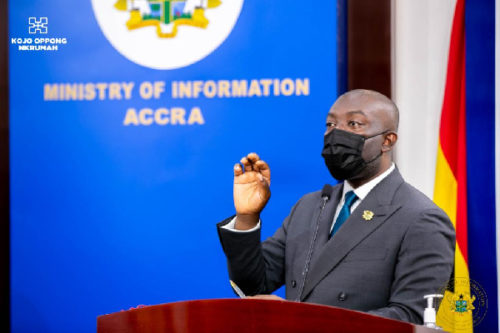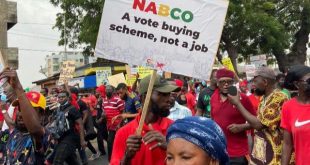
Kojo Oppong-Nkrumah is Minister for Information
Kojo Oppong-Nkrumah, the Minister of Information, has provided further details on why the decision by the government to create another national bank, to be known as the Development Bank Ghana (DBG), is necessary.
This past Wednesday, an agreement between the Ministry of Finance and the European Investment Bank (EIB), for the provision of a €170 million facility for the establishment of the new national bank, was signed.
It formed part of an official visit by President Nana Addo Dankwa Akufo-Addo to Belgium this week, where he met with the president of the EIB, Dr. Werner Hoyer, to discuss the new move, reports citinewsroom.com.
There have been questions about the need or not for another national bank, given the existence of the National Investment Bank (NIB), Agricultural Development Bank (ADB), the Consolidated Bank Ghana (CBG), and the Ghana Commercial Bank.
But, giving further justifications for the setting up of this new bank, Kojo Oppong-Nkrumah said that the development bank will, through the commercial banks, provide certain key sectors with loans at relatively favorable conditions and rates.
“The Development Bank, unlike the Commercial bank is able to mobilize significantly larger amounts of money for a significantly longer period and significantly lower rates of interests. It focuses on sectors that are mainly for development, but may not be the preference areas of commercial banks.
“One of the challenges that commercial banks in our country have had over the years is the ability to get access to large folds of deposits for long tenures and at lower rates, and even to lend to sectors of the economy that are good for development, but may not be less risky for commercial purposes.
“So, what the government has done is to set up this development bank, which is mobilizing, at least for the first over five years, in excess of over a billion dollars capitalization which the bank can now leverage on, with a multiple of two or three, and then unlend to commercial banks who will now have access to this large pool of resources to impact areas like agriculture, which will impact farmers in remote areas, manufacturing, housing, ICT, among others,” he explained.
He added that Ghana’s economy stands to benefit from the project, as the bank will take into consideration the focal areas of Ghana’s development as outlined in the National Development Plan, in the implementation of this plan.
He insisted that €170 million facility will impact on the country’s debt stock and will be fully owned by the government.
“We are building organizations that will have and subsequently balance their own balance sheets. Of course, initially, you will need capital, but once they start operating and unlending, the bank will be able to sustain itself.
“What is critical is whether or not the bank is able to inject about a billion dollars into Ghana’s banking system, which will support a lot of these commercial banks and more importantly, affect the sectors of the economy that will need financial support,” he said.
Also, he said that the government has made a contribution of about 200 million dollars of its own resources “out of the 250 million it has pledged to invest and will continue to pump money into the project.”
Kojo Oppong-Nkrumah also shot down the claims that this new move is just another “job for the boys,” stressing that the DBG is an integral feature of the GH¢100 billion Ghana Cares ‘Obaatampa’ Project, which is seeing to the revitalization of the Ghanaian economy following the onset of COVID-19.
“The Development Bank Ghana is going to play a very important part in the rapid economic transformation of Ghana, following the onset of COVID-19,” President Nana Addo Dankwa Akufo-Addo said during the signing ceremony on Wednesday.
He said “We want to restructure the economy and move it from being a mere producer and exporter of raw materials to one that places much greater emphasis on value addition activities. We see this Bank (DBG) as one that will play a pivotal role in this.”
Source : Ghanaweb
 African News Best News Portal
African News Best News Portal



